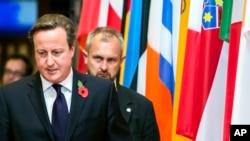Prime Minister David Cameron set off Thursday on a whirlwind visit to four European capitals, pressing his case that Britain needs to renegotiate its relationship with the 27 other members of the bloc.
It will be a tough sell. France's foreign minister signaled resistance to any major concessions on Britain's push for less centralized EU control.
The trip began as Cameron's government revealed the question British voters will be asked in a referendum by the end of 2017: “Should the United Kingdom remain a member of the European Union?”
Cameron said Wednesday that he expected the referendum bill, which is being published Thursday, to make it through Parliament and into law in “extra quick time.” The bill would allow British, Irish and Commonwealth citizens to vote in the referendum, but not most U.K. residents from other EU states.
Cameron wants Britain to stay in the EU, if he manages to negotiate a new, looser relationship with the group.
“We believe the right policy is reform, renegotiation and referendum,” he said, expressing confidence that Britain's bid for a new relationship with the EU would succeed.
Cameron plans to travel to the Netherlands, France, Poland and Germany on Thursday and Friday as part of his efforts to talk with all of the leaders of the EU member states before a European Council meeting late next month. A planned trip to Denmark was canceled because Prime Minister Helle Thorning-Schmidt called a snap election.
On Thursday, Cameron will meet Dutch Prime Minister Mark Rutte followed by talks at the Elysee Palace with French President Francois Hollande. On Friday, he meets with Polish Prime Minister Ewa Kopacz in Warsaw before traveling to Berlin for talks with German Chancellor Angela Merkel.
European leaders have expressed a desire to accommodate Britain, but it's unclear how far they will go to meet Cameron's desire for change - especially to the right of EU citizens to live and work anywhere in the bloc.
Other leaders have warned Cameron that free movement within the bloc is non-negotiable, but he hopes to gain agreement to restrict immigrants' right to claim benefits for a period of up to several years.
Hours before Cameron arrived in Paris, French Foreign Minister Laurent Fabius warned Thursday that Cameron's plan for a referendum is “very risky.”
Speaking on France-Inter radio, he said France is open to “improvements” in the way the EU functions, but “if it's about creating a specific status for Britain, so that it has advantages without constraints, then it's ‘No.’”
British Foreign Secretary Philip Hammond said it was understandable that “some of our partners will adopt a hard line at the start of the negotiations.”
“We expect our European Union partners to engage with us in delivering a package that will enable the British people to decide that Britain's future is best delivered inside the European Union,” he told the BBC.




